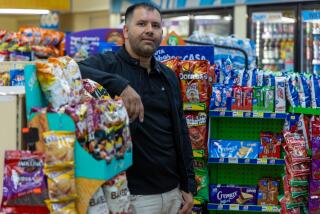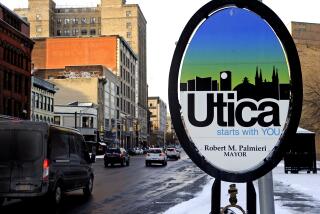Distant War’s Refugee Brings Out Community Spirit in Neighborhood
- Share via
RALEIGH, N.C. — In an era when the words “sense of community” are often spoken in nostalgic tones, a refugee from a distant war has prompted one neighborhood to demonstrate that spirit is not lost.
The tree-lined streets of Victorian and neoclassical homes in Raleigh’s historic Oakwood neighborhood are worlds away from the wreckage of the Bosnian village of Ilijas, near Sarajevo.
But for Darijo Babic, both places are home.
“Sometimes I have the feeling that I am already through one life and am living a second life,” the 21-year-old North Carolina State University engineering student says.
Reared as a Roman Catholic, Darijo was labeled a Croat when ethnic tensions began to divide his homeland.
But Darijo’s biological father was Muslim, as is his stepfather.
“Were I still in Bosnia or Croatia, I would be drafted to fight against Bosnian Muslims, but I cannot fight against myself,” Darijo wrote in an essay.
In 1992, Darijo, his mother and his half-brother fled from their Serbian-controlled hometown to Slovenia.
His stepfather, uncle and grandmother stayed behind, escaping later through the minefields surrounding the town.
As a “temporary refugee” in Slovenia, Darijo lived on meager rations under horrifying conditions.
“I lived in a refugee center with 50 different people in one room, all sharing one common toilet, so anything is better,” he says.
Today, he lives in comfort, moving among the homes of several neighbors who care for him as parents might.
Darijo spends most nights in the home of Sara and Hugh Stohler, but sometimes stays with JoAnne Sanford and her husband, Billy Brewer.
Katherine White also houses Darijo from time to time, and drives him to school two days a week.
Pamela Davison focuses on fund-raising to meet Darijo’s expenses.
At a silent auction last month, the group raised about $6,000 to cover his tuition.
Sitting in the Stohlers’ living room, Darijo sifts through a stack of documents that constitute his application for refugee status in the United States.
He pulls out a letter from his uncle recounting the destruction of their hometown, the deaths of friends and his own torture at Serb hands.
“I was in a cell with one Muslim whom they tortured, the same as me, and they also cut the soles of his feet with razor blades, and also he was beaten with chains and the butts of guns,” the uncle wrote in the letter.
Helping Darijo gather such letters and put together the enormous application was a neighborhood effort.
In fact, everything concerning Darijo has been handled as a community.
It was a former Oakwood resident working for the United Nations who met Darijo in a Slovenian refugee camp and sponsored his first visit to Raleigh in 1993.
Darijo spent the summer studying English at Wake Tech Community College.
He then returned to Slovenia to finish high school.
When that American sponsor could no longer fund Darijo’s education, the Oakwood neighbors decided to bring him back to Raleigh, where he could continue to study in safety.
“We do what needs to be done,” Sara Stohler says.
For the moment, that entails waiting to hear what will become of Darijo’s application for refugee status, raising money to pay his college tuition and petitioning the university to classify him as a state resident, which would qualify him for lower tuition.
“The situation that we’re in is that Darijo is in the position of a family member to us,” says Sanford, a neighbor who is heading the effort to help Darijo attain in-state status.
“He is completely dependent on us for support in the same way as our own children are.”
Sanford and the others are as fiercely protective of Darijo as if he were their own.
“I would oppose to the absolute last breath any attempt to send him back right now,” Sanford says.
Although Darijo feels lucky, he cannot help missing his family, now refugees in Switzerland.
“I have counted I have stayed in about 80 different houses in three or four years, and none of them was my home,” he says.
He also can’t help wondering what the hatred fed by war will mean to the future of his country.
“I think what would happen if I went back and saw my best friend, who is Serb, and we looked at each other,” Darijo says.
“I wouldn’t shoot him, but I don’t know if he would shoot me.”
More to Read
Sign up for Essential California
The most important California stories and recommendations in your inbox every morning.
You may occasionally receive promotional content from the Los Angeles Times.













